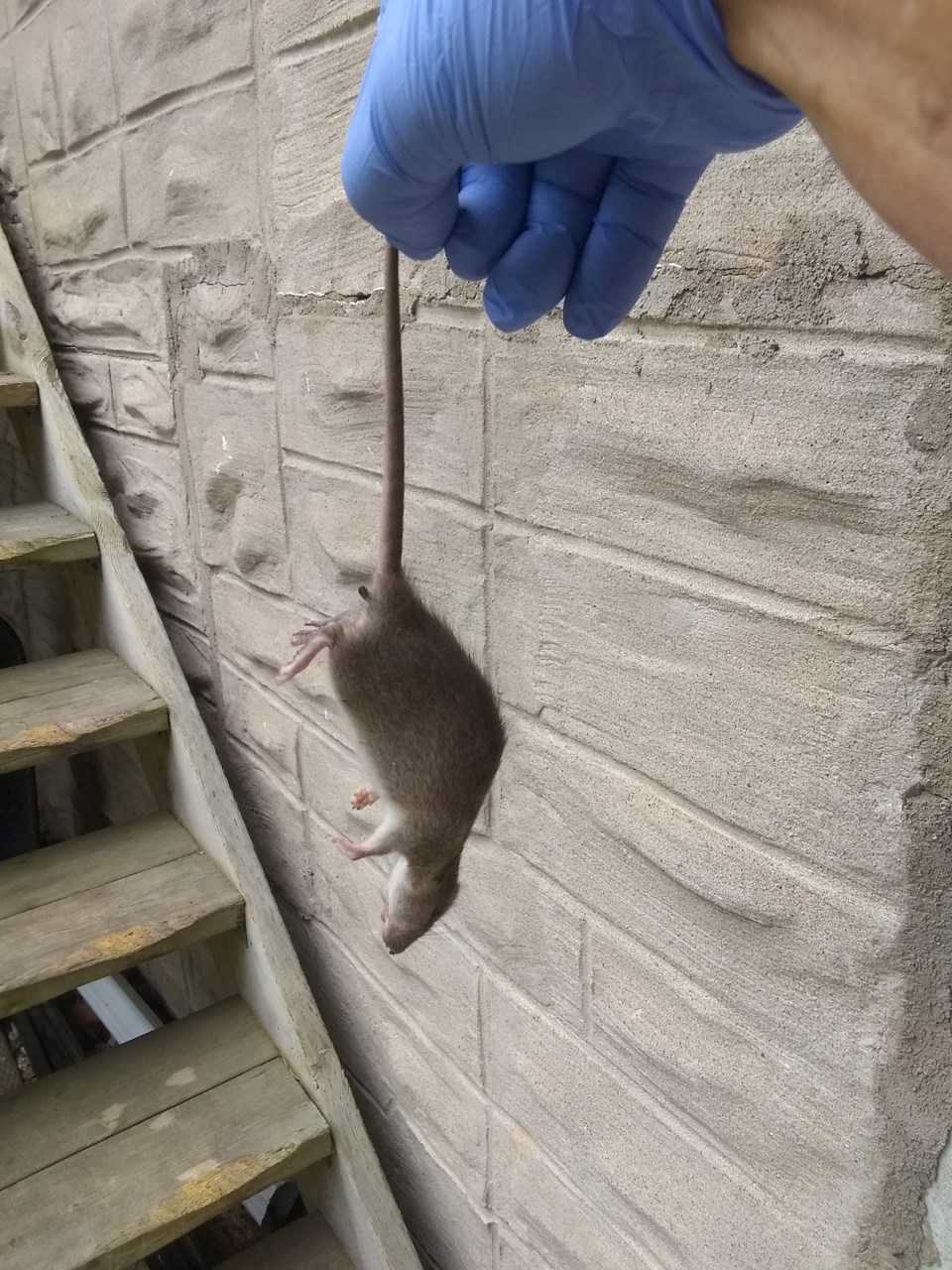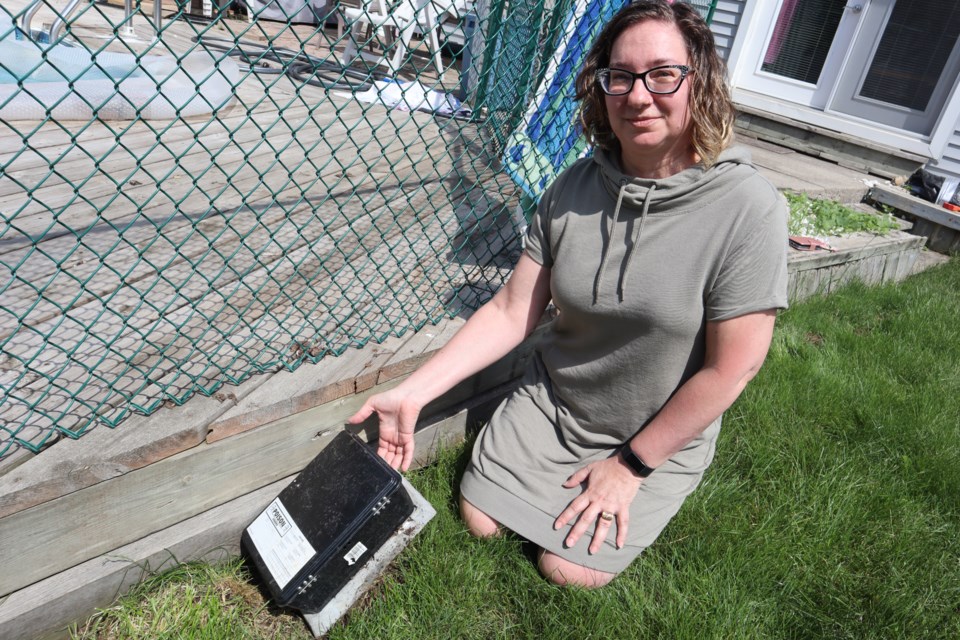Seeing a large rat scamper down her driveway and squeeze under her neighbour’s shed two summers ago was bad enough.
“My immediate thought was, ‘was that an opossum?’” Mirela Kovacevic-Smith recalls thinking.
It was that big.
Then she caught one scratching around the basement of their Preston home a few weeks later and immediately asked her husband to call an exterminator.
With bait boxes in place around their home, the couple looked for holes the rodent might have squeezed through, and used wire mesh to seal up all visible cracks and crevices.
Outside, Kovacevic-Smith knew their wooden pool deck likely harboured skunks or rabbits, but now she feared rats might be nesting under it too.
So, they set bait boxes around the deck and went another summer without any problems. Her daughter found a dying rat in their backyard, but nothing got inside the house.
The King Street roadwork she suspected might have sent rats fleeing into her neighbourhood was wrapping up. The problem might go away on its own, she thought.
Then two weeks ago, her daughter found a rat in her bedroom.
They trapped it humanely at first, but it returned the same night and found its way into a spring trap.
It was the last straw.
“My concern is the rat problem is going to get bigger. I do not want any more rats in my house.”
So, this week, Kovacevic-Smith took to Facebook to ask her Preston neighbours to tell their rat stories.
Her post has since been flooded with responses.
“Everyone I’ve spoken to has had some experience,” she said, recalling one neighbour’s account of brake lines being chewed in their car.
 Frank Moses posted this photo of a rat he caught on Rose Street in Preston. By Frank Moses/Facebook
Frank Moses posted this photo of a rat he caught on Rose Street in Preston. By Frank Moses/FacebookShe estimates thousands of dollars have been spent on her street to control the problem; a problem everyone, including city bylaw, knows originates from one house that has what can only be described as an infestation.
It’s not unexpected for people to see more rats in the city, said Bruno Levesque, Ontario Regional Manager for pest control company Orkin Canada at the Cambridge office.
Highlighting other reasons why rats are a problem, he said every city in Ontario is experiencing an increase this year.
The rodents are migrating into subdivisions in search of food because restaurants in city cores remained closed, he said.
Spring construction also plays a role since roadwork and development tends to stir up nests and disperse rodent populations.
“As with all pests, wildlife and rats, they were here first,” Levesque said, adding the most common rat in Ontario is the Norway rat.
The burrowing rodents like to dig nests underground and can often be found under sheds or decks around homes.
He recommends using a mesh landscape barrier to prevent rats from burrowing under outbuildings and decks.
Homeowners can prevent rats from getting inside their homes by sealing up any openings.
“They can fit in anything from half an inch or bigger,” Levesque said.
Also, eliminate clutter around the house that could provide shelter and ensure any garbage is stored in tightly-sealed containers.
Dog feces is a source of food for rats, so cleaning that up regularly is essential. Bird feeders or any pet food left outside can also be a draw.
“Overgrown foliage is another area rats tend to navigate towards,” he said.
Kovacevic-Smith admits her home's not perfect. There a places rats could hide. But that's not the issue in her neighbourhood.
She doesn't want to point fingers. She doesn't want to shame anyone. But enough is enough.
She said her problem is minor compared to what some immediate neighbours of the infested property are dealing with.
“Their anxiety is through the roof,” she said, describing how they looked out their window and counted a dozen rats perched on the roof of the infested home.
Kovacevic-Smith walked by the house with her husband last week and saw two rats scaling a tree on the property.
“The city is aware of the problem,” she said. “They tell me they’re trying to work it out. But it’s been three years."
She’s hoping more calls to the city will force the city to act faster.
But Dan Smith, manager of bylaw compliance for the City of Cambridge, said they’re already working as fast as they can with a goal to address the root of the problem.
Smith said the city is using everything in its legislative authority to deal with the source, including property maintenance and using an exterminator.
“We’re working through it,” Smith says, adding he understands people want immediate results, but in wanting to address the core issue and not provide a band-aid solution, he urges patience.
“The complaints that we’re getting now are in Preston,” Smith said, confirming it’s not a widespread concern in Cambridge.
He urges residents to call or use the Service Cambridge Portal to log any property standards complaint they feel might be harbouring a rat infestation.
The portal allows residents to log complaints so city staff can respond quickly with as much information as possible.
“What we would do is try to obtain the location of where the rats are coming from,” Smith said, adding it's usually not difficult to figure out since a poor yard maintenance, clutter and generally shoddy appearance points to probable violation of the city's property standard's bylaw.
But there's only so much they can do.
Bylaw only has the authority to deal with property violation standards observed outside of a dwelling. They don’t have the legislative right to enter a home even if it’s obvious that an infestation is coming from inside, he said.
That often makes the problem more difficult to solve.
If a homeowner doesn’t want to comply with a cleanup order, the city will do the work for them, billing them for any incurred costs through property taxes.
The two-pronged approach also invites an exterminator in to set up bait traps.
"That’s the stage we’re at right now," Smith said. "Trying to let the pest control company do their job. It can take time."
Further intervention may be necessary if continued non-compliance becomes an issue, including the region's public health department.
Smith said they use every resource at their disposal, but ultimately they rely on property owners to keep their homes and yards to the minimum standard of the law.



